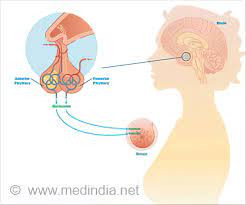Definition
Prolactinemia, also known as hyperprolactinemia, is a medical disorder characterized by elevated levels of the prolactin hormone. Prolactinemia is estimated to have a prevalence of around 1% in the general population. The condition is not life-threatening, but it may affect several organ functions, particularly the reproductive system.
Prolactin hormone, referred to as lactotropin, contributes to the development of mammary glands, milk production, and breastfeeding. This hormone also controls some physiological processes and functions.
The pituitary gland, located at the bottom of the brain, produces the prolactin hormone.
- The central nervous system includes the brain and spinal cord
- Immune system
- Uterus
- Mammary glands
Prolactin levels decrease in males, non-breasting females, and non-pregnant females. It generally increases in pregnant or breastfeeding women. Other hormones can regulate prolactin levels, specifically prolactin inhibitory factors, including dopamine. Typical blood concentrations of the hormone prolactin are as follows:
- For men : Less than 20 ng/mL
- Non-breastfeeding women: fewer than 25 ng/mL
- For pregnant or nursing women: 80–400 ng/mL
Prolactin levels may increase during pregnancy. Estrogen and progesterone levels drop significantly after giving birth. High levels of prolactin stimulate the production of breast milk. When a woman is not expecting a child, prolactin plays a role in controlling her menstrual cycle. Prolactin influences sperm production in males.
Causes
A benign prolactinoma tumour may develop in the pituitary gland, leading to prolactinemia. The overproduction of the prolactin hormone originates from this tumor. Headaches, nausea, vomiting, vision changes (particularly a narrowing of the external visual fields), pain around the nose area, and smell problems are all possible symptoms of prolactinoma.
Besides prolactinoma, another contributing factor to prolactinemia is the consumption of medicines that increase blood prolactin levels. These medicines may cause difficulties with dopamine synthesis, impairing dopamine's ability to control prolactin. Estrogen treatment is one of the specific medications. Nevertheless, discontinuing medication without approval from the doctor is not advisable.
You can read more about estrogen therapy in the Ai Care article: Estrogen Medications - How It Works, Contraindication, and Side Effects.
The following medical conditions may result in prolactinemia:
- Hypothyroidism
- Renal disease
- Herpes zoster, or snake pox, particularly on the chest
- Fractures of the chest wall, including sternum, rib, and lung injuries
- Ovarian polycystic syndrome
- Cushing's Disease
- Nelson's Illness
- Tumor of the pituitary gland
- Nipple stimulation and over-exercising are additional causes
Occasionally, the etiology of prolactinemia remains unknown. This disease is referred to as idiopathic prolactinemia and typically resolves spontaneously within a few months.
Risk factor
People under the age of 40 are more likely to experience prolactinemia. Prolactinemia affects women more often than men. In children, prolactinemia is very uncommon.
Symptoms
Certain individuals with prolactinemia may have relatively moderate symptoms or remain asymptomatic. Prolactinemia may lead to common symptoms in both males and females, including:
- Infertility
- Decreased libido
- Osteopenia (decreased bone mass)
- Milky discharge from the nipples in the absence of pregnancy or lactation
Common symptoms of prolactinemia in women include:
- Menstrual irregularities not associated with menopause
- Pain during penetrative intercourse may occur due to vaginal dryness
The following are symptoms of prolactinemia in males:
- Deficiency of erection
- Insufficient testosterone levels
- The enlargement of the breast (gynecomastia)
Diagnosis
When prolactinemia symptoms are present, a doctor may order a blood prolactin test. If prolactinemia is diagnosed, the next step is to identify its cause. Your doctor may recommend more diagnostic procedures, including blood tests and radiological examinations.
Management
Treatment for prolactinemia varies depending on the underlying factors. Therapy may not be necessary for some individuals with high prolactin levels if they either do not have any symptoms at all or only moderate ones.
Prolactinoma is the most common cause of prolactinemia, and there are various treatments, including:
- Pharmacological treatment
Dopamine agonists effectively regulate prolactin levels and have high efficacy in reducing the size of prolactinoma tumors.
- Surgery
If pharmacological interventions are ineffective in reducing the size of the prolactinoma, surgical intervention may be necessary to excise the tumor.
- Radiations
This is a less common procedure for treating prolactinoma. If decreasing the prolactin levels with medicine and/or surgery is not successful, this therapy may be considered.
Hypothyroidism, a condition that may lead to elevated levels of prolactin, is managed by administering synthetic thyroid hormone, which is expected to regulate prolactin levels. Doctors may prescribe additional medications that are similar to the ones that are causing prolactinemia. These medications may not cause an elevation in prolactin levels or may only cause a slight increase.
Complications
Prolactinemia is not life-threatening; however, it may decrease the quality of life and lead to infertility and menstrual disorders.
Prevention
Carrying a genetic condition known as multiple endocrine neoplasia type 1 is the primary risk factor for prolactinoma. To find out if you have the same disorder as a family member who has it, genetic testing is an option. Early detection may help identify prolactinoma.
When to see a doctor?
If you develop hyperprolactinemia symptoms, you are advised to visit your doctor. The doctor may help you with prolactinemia treatment.
If you need medical advice or consultation, you can either visit a doctor or use the consultation features available in the Ai Care application by downloading the Ai Care application from the App Store or Play Store.
Looking for information about other diseases? Click here!
- dr. Yuliana Inosensia
Hyperprolactinemia: What It Is, Causes, Symptoms, & Treatment. (2022). Retrieved 6, 2022, from https://my.clevelandclinic.org/health/diseases/22284-hyperprolactinemia
Hyperprolactinemia (high prolactin levels). (2022). Retrieved October 6, 2022, from https://www.reproductivefacts.org/news-and-publications/patient-fact-sheets-and-booklets/documents/fact-sheets-and-info-booklets/hyperprolactinemia-high-prolactin-levels/
Hyperprolactinemia: Practice Essentials, Pathophysiology, and Epidemiology. (2022). Retrieved 6, 2022, from https://emedicine.medscape.com/article/121784-overview







